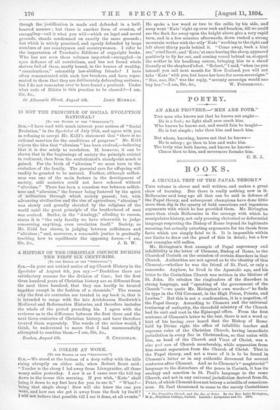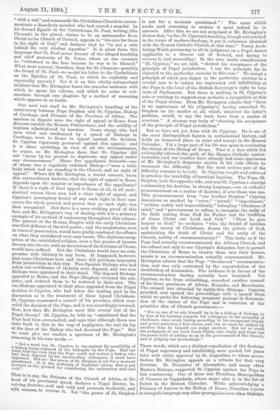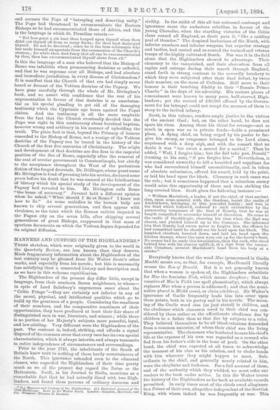BOOKS.
A CRUCIAL TEST OF THE PAPAL THEORY.* THIS volume is clever and well written, and makes a great. show of learning. But there is really nothing new in it Bellarmine said long ago all that can be said in defence of the Papal theory, and subsequent champions have done little more than dig in the cmarry of bold assertions and ingenious. arguments with which he has provided them. Mr. Rivington more than rivals Bellarmine in the courage with which he manipulates history, not only pressing rhetorical or deferential language respecting the Bishop of Rome beyond its legitimate meaning, but actually extorting arguments for his thesis from, facts which are simply fatal to it. It is impossible within our limits to draw out the proof of this in detail; but a few test examples will suffice.
Mr. Rivington's first example of Papal supremacy and infallibility is the letter of Clement, Bishop of Rome, to the Church of Corinth on the occasion of certain disorders in that Church. Authorities are not agreed as to the identity of this Clement,—whether he was the friend of St. Paul, or only a. namesake. Anyhow, he lived in the Apostolic age, and his letter to the Corinthian Church was written in the lifetime of St. John. He rebukes the ringleaders of the disorders in strong language, and "speaking of the government of the Church "—we quote Mr. Rivington's own words—" he finds. its type in the Old Covenant, in the High Priest, Priests, and Levites." Bat this is not a confirmation, it is a negation, of the Papal theory. According to Clement and the universal testimony of antiquity, the threefold ministry of the Church had its unit and root in the Episcopal office. From the first sentence of Clement's letter to the last, there is not a word or hint of his having ever heard that the Bishop of Rome held by Divine right the office of infallible teacher andi supreme ruler of the Christian Church, having immediate jurisdiction in every See in Christendom, so that union with him, as head of the Church and Vicar of Christ, was a sine qua* non of Church membership, while separation from him meant separation from the Church of Christ. That is the Papal theory, and not a trace of it is to be found in Clement's letter or in any authentic document for several centuries after Clement. And as to Clement's" magisterial' language to the disturbers of the peace in Corinth, it has ita analogy and sanction in St. Paul's language to the same Church, and not in any universal jurisdiction derived from St. Peter, of which Clement does not betray a scintilla of conscious- ness. St. Paul threatened to come to the unruly Corinthians • The Primitive Church and the Sea of Peter. By tie Rev. Luke Rivington. Mat., /slagde.len Oollege, Oxford, London' Longmane and Oo. RE&
" with a rod," and commands the Corinthian Church to excom- municate a disorderly member who had caused a scandal. In his Second Epistle to the Corinthians, St. Paul, writing (like Clement) in the plural, claims to be an ambassador from Christ to the Church of Corinth, appeals to "his care for them in the sight of God," and declares that he "is not a whit behind the very chiefest Apostles." It is plain from this language that St. Paul never dreamt of the alleged headship and chief pastorate of St. Peter, whom on one occasion he "withstood to the face because he was to be blamed." What more natural, therefore, than for St. Clement—possibly the friend of St. Paul—to model his letter to the Corinthians on the Epistles of St. Paul, to which he explicitly and repeatedly appeals ? Yet it is on this wholly unimportant incident that Mr. Rivington bases the oracular sentence with which he opens his volume, and which he seeks to sub- stantiate through two chapters by a method of reasoning which appears to us feeble.
Our next test shall be Mr. Rivington's handling of the controversy between Pope Stephen and St. Cyprian, Bishop of Carthage and Primate of the Province of Africa. The matters in dispute were the right of appeal to Rome from dioceses outside the Roman Patriarchate, and the validity of baptism administered by heretics. Some clergy, who had been tried and condemned by a synod of Bishops in Carthage, went to Rome to appeal against the decision. St. Cyprian vigorously protested against this appeal; and it is sheer quibbling, in view of all the circumstances, to argue, as Mr. Rivington does, that St. Cyprian did not "mean by his protest to deprecate any appeal under any circumstances." These five appellants, forsooth—one of whom was a regularly ordained Bishop—" were a little body which had no standing in the Church, and no right of appeal." Where did Mr. Rivington, a recent convert, learn this extraordinary doctrine, that the right of appeal to Rome depends upon the number or importance of the appellants? If there is a right of final appeal to Rome at all, in all eccle- siastical causes, these men had a clear right of appeal, and Cyprian's peremptory denial of any such right in their case covers the whole ground, and proves that no such right was then recognised. But there is a more striking proof of this fact, and Mr. Rivington's way of dealing with it is a palmary example of his method of controversy throughout this volume. The quarrel of the Roman Empire with the early Christians was their defiance of the civil power; and the magistrates, even in times of persecution, would have gladly condoned the offence on what they considered very easy terms. The slightest recog- nition of the established religion, even a few grains of incense thrown into the air, with an invocation of the fortunes of Ca3sar, would have sufficed. But the Christians would have no com- promise with idolatry in any form, It happened, however, that some Christians here and there did purchase immunity from persecution in this way. Two Spanish Bishops who had taken out certificates of idolatry were deposed, and two new Bishops were appointed in their stead. The deposed Bishops appealed to Rome, and the Pope (Stephen) reversed the sen- tence, and ordered them to be restored to their sees. The two Bishops appointed in their place appealed from the Papal decision to Cyprian, who had taken the leading part in the discussion as to the treatment of these lapsed Christians. St. Cyprian summoned a council of his province, which over- ruled the decision of the Pope, and it was accordingly reversed. Now, how does Mr. Rivington meet this crucial test of the Papal theory? St. Cyprian, he tells us, "considered that the Pope had been overreached, and says that although there was some fault in this in the way of negligence, the real sin lay at the door of the Bishop who had deceived the Pope." But we must give our readers a specimen of Mr. Rivington's reasoning in his own words :—
"Not a word has St. Cyprian to say against the possibility of a bishop being replaced in his bishopric by the Pope. Had our saint held the view that the Pope could not restore a bishop who had been deposed by his surrounding colleagues, it must have appeared But no : the power of St. Stephen is not for a moment questioned It is the certainty of Baailides' crimes that is put
forward as the ground for considering the restoration null and void."
That is to say, the Primate of the Church of Africa, at the head of his provincial synod, declares a Papal Decree, in- volving doctrine, null and void, and proceeds forthwith, and with success, to reverse it. Yet "the power of St. Stephen is not for a moment questioned" ! The cause which needs such reasoning to sustain it must indeed be in extremie. After this, we are not surprised at Mr. Rivington's dictum that," so far, St. Cyprian's teaching, though not couched in the terms of modern theology, is yet in substance identical with the Roman Catholic Church at this time." Fancy Arch- bishop Walsh presuming to sit in judgment on a Papal decree applicable to a diocese out of Ireland, and daring to reverse it, and succeeding! In the case under consideration "St. Cyprian," we are told, "showed his acceptance of the principle of Papal jurisdiction. I say the principle, for he objected to the particular exercise in this case." To accept a
principle of which you object to the particular exercise in a crucial case is to reduce the supremacy and infallibility of the Pope to the level of the British Sovereign's right to veto Acts of Parliament. But there is nothing in St. Cyprian's acts or writings to support even so feeble a recognition as this of the Papal claims. Even Mr. Rivington admits that "there is no appearance of his LOyprian's] having consulted St. Stephen on the matter at all, which, whatever the latter's position, would, to say the least, have been a matter of courtesy." A strange way truly of "showing his acceptance of the principle of Papal jurisdiction."
But we have not yet done with St. Cyprian. He is one of the most distinguished figures in ecclesiastical history, and holds an honoured place as saint and martyr in the Roman Calendar. Yet a large part of his life was spent in combating the claims of the Bishop of Rome. That is a fact which lies awkwardly athwart the path of the Roman Catholic contro- versialist, and our readers have already had some specimens of Mr. Rivington's desperate straits in his vain efforts to surmount the difficulty. But the most serious part of the difficulty remains to be told. St. Cyprian taught and enforced in practice the invalidity of heretical baptism. The Pope, St. Stephen, took the opposite side, and sent St. Cyprian a rescript condemning his doctrine in strong language,—an era cathedra pronouncement on a matter of doctrine, if ever there was one. This pronouncement from "our brother Stephen" Cyprian denounces as marked by "error," "proud," "impertinent," " written rashly and improvidently," betraying "blindness of mind," and "perverseness to refuse to recognise the unity of the faith coming from God the Father and the tradition of Jesus Christ our Lord and God." "Does he give honour to God," he exclaims, "who, the friend of heretics and the enemy of Christians, deems the priests of God, maintaining the truth of Christ and the unity of the Church, worthy of excommunication?" This looks as if the Pope had actually excommunicated the African Church, and his refusal not only to see Cyprian's delegates, but to permit the Christians of Rome to receive them into their houses, points to an excommunication actually consummated. Mr.
Rivington admits that the Pope " threatened " excommunica- tion, and was only restrained by the ezpostulation of the Archbishop of Alexandria. The evidence is in favour of the excommunication having actually been launched. Yet Cyprian, so far from submitting, convoked another council
of the three provinces of Africa, Numidia, and Mauritania. The council was attended by eighty-five Bishops. Cyprian presided, and opened the proceedings with a speech from which we quote the following pregnant passage in denuncia- tion of the claims of the Pope and in assertion of the primitive idea of Church government :—
" For no one of us sets himself up to be a bishop of bishops, or by fear of his tyranny compels his colleagues to the necessity of obedience, since every bishop according to his recognised liberty and power possesses a free choice, and can no more be judged by another than he himself can judge another. But let us await the judgment of our Lord Jesus Christ, who singly and alone has the power both of setting us up in the government of His Church, and of judging our proceedings."
These words, which are a distinct repudiation of the doctrine of Papal supremacy and infallibility, were quoted 140 years later with entire approval by St. Augustine, to whom never- theless Mr. Rivington appeals as a witness for that very doctrine. St. Dionysius of Alexandria, and many other Eastern Bishops, supported St. Cyprian against the Pope in this controversy. One of these was Firmilian, Metropolitan of Ca3sarea in Cappadocia, whose name also is in the list of Saints in the Roman Calendar. While acknowledging a Primacy of honour in the Bishop of Rome, Firmilian rejects in energetic language any other prerogative over other Bishops, and accuses the Pope of "betraying and deserting unity."
-The Pope had threatened to excommunicate the Eastern Bishops as he had excommunicated those of Africa, and this is the language in which St. Firmilian retorts :— " But how great a sin hast them heaped upon thyself when thou didst cut thyself off from so many flocks ; for thou hut destroyed thyself. Do not be deceived ; since he is the true schismatic who has made himself an apostate from the communion of the Church's .oneness; for while thou dost fancy that all can be excommunicated by thee, thou has excommunicated thyself alone from all."
Is this the language of a man who believed that the Bishop of Rome was infallible when pronouncing decisions ea cathedrit, and that he was supreme over all Bishops, and had absolute and immediate jurisdiction in every diocese of Christendom P It is manifest that the Church of that era had simply never heard or dreamt of the Vatican doctrine of the Papacy. We have gone carefully through the whole of Mr. Rivington's book, and we assert with confidence that the rest of his argumentation in favour of that doctrine is as unsubstan- tial as his special pleading to get rid of the damaging testimony whioh the Cyprianic age bears against the Papal .claims. And the testimony is all the more emphatic from the fact that the Church eventually decided that the Pope was right in this controversy about heretical baptism, however wrong and arbitrary in his manner of upholding the truth. The plain fact is that, beyond the Primacy of honour conceded to the Bishop of Rome, not a vestige of the Vatican ,doctrine of the Papacy can be traced in the history of the 'Church of the first five centuries of Christianity. The origin and development of that doctrine are due first to the imperial position of the See of Rome, especially after the removal of the seat of secular government to Constantinople, but chiefly to the acceptance throughout the West of the portentous fiction of the forged decretals. Dr. Bollinger, whose great name Mr. Rivington is fond of pressing into his service, declared some Tears before his death that he was amazed at the falsifications .of history which his special study of the development of the Papacy had revealed to him, Mr. Rivington calls Rome " the home of accuracy." Juvenal held a different opinion when he asked, "What should I do at Rome P I know not how to lie." As some maladies in the human body are known to skip several generations, and then appear with virulence, so the taint which the Roman satirist imputed to the Pagan city on the seven hills, after skipping several generations of great Bishops, reappeared in that mass of spurious documents on which the Vatican dogma depended for fits original diffusion.




































 Previous page
Previous page